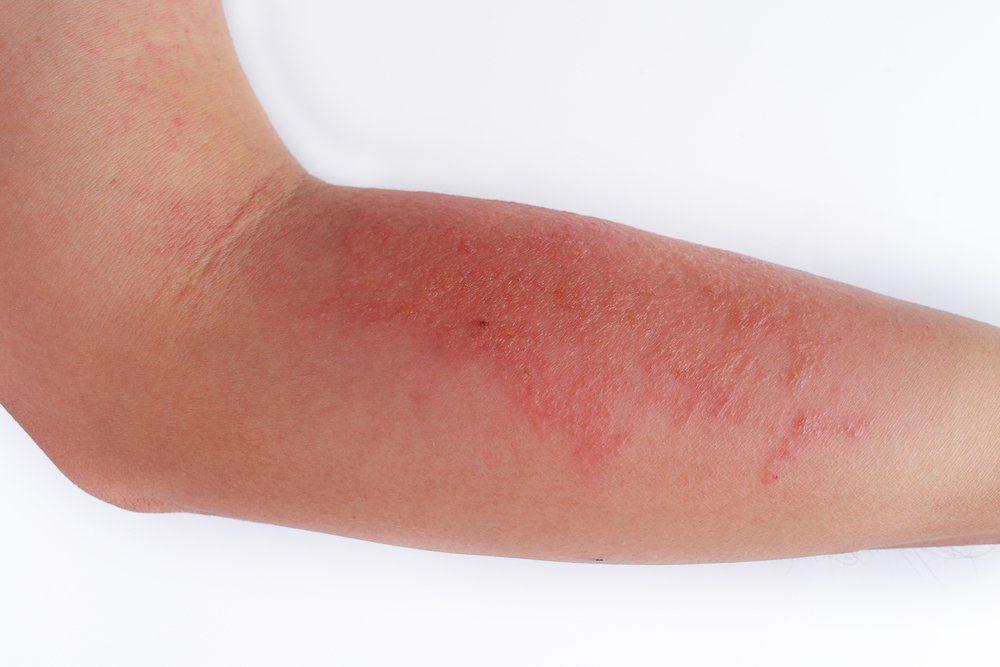- Acne
- Actinic Keratosis
- Aesthetics
- Alopecia
- Atopic Dermatitis
- Buy-and-Bill
- COVID-19
- Case-Based Roundtable
- Chronic Hand Eczema
- Chronic Spontaneous Urticaria
- Drug Watch
- Eczema
- General Dermatology
- Hidradenitis Suppurativa
- Melasma
- NP and PA
- Pediatric Dermatology
- Pigmentary Disorders
- Practice Management
- Precision Medicine and Biologics
- Prurigo Nodularis
- Psoriasis
- Psoriatic Arthritis
- Rare Disease
- Rosacea
- Skin Cancer
- Vitiligo
- Wound Care
Article
Pfizer reports positive results from second abrocitinib monotherapy study
Author(s):
Full results from the second of two trials investigating the JAK1 inhibitor abrocitinib as a monotherapy for treatment of moderate-to-severe atopic dermatitis demonstrate statistical superiority of both doses compared to placebo.

An emerging treatment for atopic dermatitis (AD) now has more clinical data behind it with the recent publication of the full phase 3 results of the JADE MONO-2 study in JAMA Dermatology, which evaluated the safety and efficacy of abrocitinib (PF-04965842, Pfizer), a once daily oral Janus kinase 1 (JAK1) inhibitor for moderate-to-severe AD in patients 12 years and older.
JAK1 inhibition is said to influence interleukin (IL)-4, IL-13, IL-22, IL-31and interferon gamma – all of which are thought to be involved in the pathophysiology of atopic dermatitis.
The study is just one of two pivotal trials investigating abrocitinib as a monotherapy (JADE MONO-1 and JADE MONO-2), with the drug being granted a breakthrough therapy designation from the U.S. Food and Drug Administration in February 2018.1
The JADE MONO-2 trial was a 12-week, double-blind, randomized, parallel-group, placebo-controlled study that investigated the efficacy and safety of two doses of abrocitinib (100 mg and 200 mg) as a once-daily monotherapy vs placebo in 391 patients with moderate-to-severe AD.2
MORE: Phase 3 results show abrocitinib safe, effective for atopic dermatitis
Co-primary endpoints included a minimum Eczema Area and Severity Index (EASI) score of 75 or greater from baseline at week 12 and an Investigator Global Assessment (IGA) score of clear (0) or almost clear (1) with a two-point or more improvement relative to baseline reported at week 12.
Additionally, secondary endpoints included a proportion of subjects achieving a 90% or greater change from baseline at week 12 in EASI score, as well as a proportion of subjects achieving a four-point or greater decrease in itch severity according to the Peak Pruritis Numerical Rating Scale (PP-NRS) at weeks 2, 4 and 12.
Results of the study show abrocitinib met all primary and secondary endpoints while demonstrating statistical superiority to placebo with researchers reporting both doses of abrocitinib subjects achieved EASI-75, EASI-90, PP-NRS and IGA responses in a greater proportion versus placebo.
For IGA, the abrocitinib 200-mg arm had a response rate of 38.1% compared to the 100-mg arm (28.4%) and placebo (9.1%). Meanwhile, 61% of the 200-mg arm achieved an EASI-75 response rate vs 44.5% and 10.4% for the 100-mg arm and placebo, respectively. PP-NRS improvement was recorded as 55.3% (200 mg), 45.2% (100 mg) and 11.5% (placebo). Also, 37.7% of the 200-mg arm achieved EASI-90 compared to 23.9% (100 mg) and 3.9% (placebo).2
Additionally, from weeks 2 to 12, IGA, EASI-75, EASI-90 and PP-NRS responses were reported as higher at each time point vs placebo.
The safety profile was consistent with previous studies, with the most common treatment-emergent adverse events (AEs) in the abrocitinib 200 mg, 100 mg and placebo arms being nausea, atopic dermatitis and nasopharyngitis.
Herpangina and pneumonia were reported in the 100-mg arm as serious treatment-related AEs, and eczema herpeticum and staphylococcal infection were reported in the placebo group. Meanwhile, no serious treatment-related AEs were reported in the 200-mg group. Rate of AEs included 65.8% (n=155) in the 200-mg arm, 62.7% (n=158) in the 100-mg group and 53.8% (n=78) in the placebo group.2
Previous results from a comparator study (JADE COMPARE) released in March 2020 reveal abrocitinib was both safe and effective in treating AD when used in combination with other therapies, such as dupilumab (Dupixent, Sanofi and Regeneron Pharmaceuticals). Abrocitinib and dupilumab also demonstrated superiority over placebo during both weeks 12 and 16 of the comparator trial.3
“Results from the second pivotal trial for abrocitinib reinforce the potential symptom relief it can offer those living with moderate to severe atopic dermatitis, including for itch - one of the most bothersome symptoms of AD,” says Michael Corbo, Ph.D., chief development officer, inflammation & immunology, Pfizer Global Product Development. “We are hopeful that these findings, should abrocitinib be approved, will translate into meaningful improvements for patients who face daily challenges with this disease.”
References:
1. Pfizer Announces Positive Top-Line Results from Third Phase 3 Trial of Abrocitinib for Moderate to Severe Atopic Dermatitis, Which Showed Improvements in Skin Clearance, Disease Extent and Severity, and Itch. (2020, March 16). Retrieved June 04, 2020, from https://www.pfizer.com/news/press-release/press-release-detail/pfizer_announces_positive_top_line_results_from_third_phase_3_trial_of_abrocitinib_for_moderate_to_severe_atopic_dermatitis_which_showed_improvements_in_skin_clearance_disease_extent_and_severity_and_itch
2. Complete Results from Second Pivotal Monotherapy Study of Abrocitinib Published in JAMA Dermatology. (2020, June 03). Retrieved June 04, 2020, from https://investors.pfizer.com/investor-news/press-release-details/2020/Complete-Results-from-Second-Pivotal-Monotherapy-Study-of-Abrocitinib-Published-in-JAMA-Dermatology/default.aspx
3. Petronelli, M. (2020, March 26). Phase 3 results show abrocitinib safe, effective for atopic dermatitis. Retrieved June 04, 2020, from https://www.dermatologytimes.com/atopic-dermatitis/phase-3-results-show-abrocitinib-safe-effective-atopic-dermatitis
Newsletter
Like what you’re reading? Subscribe to Dermatology Times for weekly updates on therapies, innovations, and real-world practice tips.











